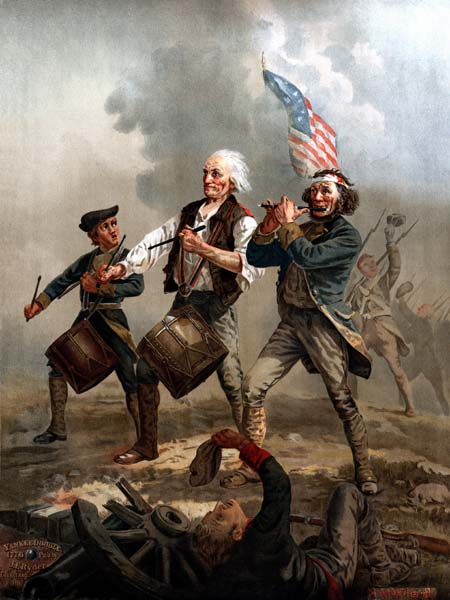
Re-thinking the American character
America’s unique ‘national character‘ — the common underlying values and patterns of thought that gives our nation its “flavor” — is under assault as we re-think what we, as a nation, think about the use of torture; the role of government (the ‘Good guys’) in our lives and the social security it provides; the nature of 21st-century capitalism, and how we now think about Wall Street and corporate executives (the ‘Bad guys’) who failed to place their patriotic duty to be good corporate citizens ahead of consumer protections, while shipping millions of good paying American jobs overseas in the name of corporate profits (or more likely, losses), then, adding insult to injury, paying themselves scores of millions in bonuses and compensation, while wrecking the Global economy. But it doesn’t end there. Corporate scandals that obliterate entire companies — and the suppliers, familes and lives that depend on them — all in the name of greed are legion and have grown from trickles, to torrents.

Contortions
Similarly, we are contorting ourselves as a society as we consider the value of torture. Slate.com — a favorite of the Washington intelligencia — is currently running an article titled “We’re All Torturers Now” discussing the implications of the now-released Bybee Torture Memo (See PDF version here). Our hisorical collective thought and cultural values on ‘Torture’ (defenders call it, “enhanced interrogation techniques”) have been challenged and undermined by the previous administration’s so-called “war on Terror” and the resulting collapse of accountability in their efforts to circumvent the U.S. Constitution. This has opened the way for an ‘imperial presidency’ and the way forward for torture as a national security policy. Legal scholars argue convincingly that left unchecked this may be setting dangerous legal precedents that now makes possible the emergence of a future American dictator president. In addition, by embracing torture we send a cue to our enemies that gravely endangers the lives of our soldiers and CIA operatives around the world. In this context, I found this article by David Brooks, a conservative columnist for the New York Times, extremely interesting as Americans conceptually work through the implications of these complex questions, and how it might change the way Americans see themselves in the World. Demographics matter in re-thinking the American character. These values will change as we incorporate different approaches and different patterns of thought — particularly as we evolve as a culturally diverse nation — in, for example, nuances in the exercise of American power around the world, as the current president is exemplifying.
Further, in the context of the current global financial crisis, Americans now know that the crisis began on Wall Street, and that our brand of capitalism was the culprit, sending its reverberations around the world. And as I’ve written here before, despite the triumph of free-market systems the world over; and even though we like to think our form of capitalism – the Anglo-American, or Laissez Faire, model – as the only model of capitalism and otherwise synonymous with baseball & apple pie. The reality is. . . it isn’t. There are different varieties of capitalism around the world: some work better than others. No single form of capitalism has yet emerged world-wide as the global standard for a free-market economic system, but we know this much: it won’t be the Gringo brand of anything goes ‘cowboy capitalism.’
A final — but perhaps more prescient — example of how we are re-thinking  Yankee values in the context of economic and foreign policy is the question of undocumented (some call them “illegal”) immigrants and their importance, indeed centrality, to our economic well-being. Think about it: in the middle of the worse economic crisis since WWII, do we really want to deport an estimated 12 million hard-working, money-spending, tax-paying, job-creating, do-anything, low-cost labor force with $300 billion in purchasing power, and its consequent wealth effect on our economy..?? Can you imagine the resulting economic implosion on top of what we are presently slogging through..?? Contrary to popular belief, our undocumented immigrant population benefits us, more than it disadvantages. And in deporting so much human capital, en mass, how many future Einsteins or excellent soldiers, teachers and doctors would we lose the value of..?? This is the central point as we re-think basic capitalist and American norms and mores: how we view and value the untapped human capital of all Americans, how we treat and interact with our international visitors in the sandbox matters if we’re going to play, or be perceived, fairly in the Global arena, as last month’s G-20 summit made clear. That’s why the issue of what form 21st-century capitalism, how we Gringos are perceived, and what other basic Yankee values will take going forward, is so central to the issue of U.S. foreign policy.
Yankee values in the context of economic and foreign policy is the question of undocumented (some call them “illegal”) immigrants and their importance, indeed centrality, to our economic well-being. Think about it: in the middle of the worse economic crisis since WWII, do we really want to deport an estimated 12 million hard-working, money-spending, tax-paying, job-creating, do-anything, low-cost labor force with $300 billion in purchasing power, and its consequent wealth effect on our economy..?? Can you imagine the resulting economic implosion on top of what we are presently slogging through..?? Contrary to popular belief, our undocumented immigrant population benefits us, more than it disadvantages. And in deporting so much human capital, en mass, how many future Einsteins or excellent soldiers, teachers and doctors would we lose the value of..?? This is the central point as we re-think basic capitalist and American norms and mores: how we view and value the untapped human capital of all Americans, how we treat and interact with our international visitors in the sandbox matters if we’re going to play, or be perceived, fairly in the Global arena, as last month’s G-20 summit made clear. That’s why the issue of what form 21st-century capitalism, how we Gringos are perceived, and what other basic Yankee values will take going forward, is so central to the issue of U.S. foreign policy.
Even GOP Congressmen now question the future and nature of capitalism.